Feb. 8, 2024
Thesaurus : Doctrine
► Référence complète : I. Grossi, "Du nouveau sur les contours du devoir de vigilance", La lettre juridique, n° 973, 8 février 2024
____
► Résumé de l'article (fait par l'auteur) : "Le tribunal judiciaire de Paris a eu l’occasion de se prononcer pour la première fois, au fond, dans un jugement didactique et équilibré, en matière de plan de vigilance. Selon lui, le plan de vigilance de la société La Poste doit être complété par des mesures concrètes, adéquates et efficaces en cohérence avec la cartographie des risques. Le tribunal ne va cependant pas jusqu’à décider à sa place de la mesure la plus appropriée.".
____
🦉Cet article est accessible en texte intégral pour les personnes inscrites aux enseignements de la Professeure Marie-Anne Frison-Roche
________
Feb. 1, 2024
Teachings
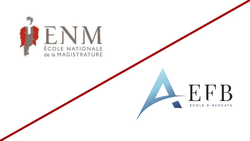
🌐follow Marie-Anne Frison-Roche on LinkedIn
🌐subscribe to the Newsletter MAFR Regulation, Compliance, Law
____
► Full Reference: F. Ancel & M.-A. Frison-Roche, Droit de la compliance (Compliance Law), École nationale de la magistrature - ENM (French National School for the Judiciary), in collaboration with the École de Formation professionnelle des Barreaux du ressort de la cour d'appel de Paris - EFB (Paris Bar School), Paris, February 1 and 2, 2024
This teaching is given in French.
____
____
► Presentation of the Teaching: The aim of this two-day conference is to enable judges and lawyers to grasp the issues, objectives and methods that define Compliance Law as it is practised in companies.
The speakers will illustrate the growing trend towards litigation, which is difficult to reconcile with the supranational dimension, or even indifference to territories, for example when disputes concern systemic climate or digital issues: the result is a renewal of the role of the judge and the role of lawyers.
This must be set against the renewal of the role and operation of companies themselves.
This is analysed from the perspective of Civil Law, in particular Contract Law and Liability Law. Company Law and Criminal Law are also addressed, as well as the way in which the legal system now integrates governance, regulation, climate and digital issues and the smooth operation of financial markets through Compliance techniques.
____
► Organisation of the Teaching: This conference is divided into two parts.
The first day is designed as a presentation of the major themes through which Compliance Law crosses the branches of traditional Law. The speakers will be professors of Law who will successively summarise the branches of Law and put into perspective the way in which Compliance imperatives give rise to new situations, new difficulties and new solutions.
This enables the second day to focus on practical and topical issues and to debate controversial questions between people of different sensibilities. The participants tend to be judges, members of regulatory authorities, lawyers, members of associations and so on.
____
► Enrolment procedure: The course is open to all judicial and consular magistrates, as well as lawyers.
Registrations can be made directly with the ENM or with the EFB.
____
► Speakers :
🎤François Ancel, Judge at the Première Chambre civile de la Cour de cassation (First Civil Chamber of the French Court of cassation)
🎤Thomas Baudesson, Attorney at the Paris Bar, Partner at Clifford Chance
🎤Guillaume Beaussonie, Full Professor at Toulouse 1 Capitole University
🎤Jacques Boulard, Premier Président de la Cour d’appel de Paris (First President of the Paris Court of Appeal)
🎤Marie Caffin-Moi, Full Professor at Paris Panthéon-Assas University
🎤Malik Chapuis, Judge at the Tribunal judiciaire de Paris (Paris First Instance Civil Court)
🎤Lucie Chatelain, Advocacy and Litigation Manager - Civil Liability of Parent Companies, Sherpa
🎤Jean-Benoît Devauges, Directeur Juridique, Ethique et Gouvernance des entreprises (Legal, Ethics and enterprises governance Director), MEDEF
🎤Marie-Anne Frison-Roche, Professor of Regulatory and Compliance Law, Director of the Journal of Regulation & Compliance (JoRC)
🎤Arnaud Gossement, Attorney at the Paris Bar, Partner at Gossement Avocats
🎤Thibault Goujon-Bethan, Full Professor at Jean Moulin Lyon 3 University
🎤Christophe Ingrain, Attorney at the Paris Bar, Partner at Darrois Villey Maillot Brochier
🎤Isabelle Jegouzo, Director of the Agence française anticorruption - AFA (French Anti-Corruption Agency)
🎤Anne-Valérie Le Fur, Full Professor at Versailles Saint-Quentin-en-Yvelines University
🎤Charlotte Michon, Attorney at the Paris Bar, partner at Charlotte Michon Avocat
🎤Jean-Baptiste Racine, Full Professor at Paris Panthéon-Assas University
🎤 Jean-Christophe Roda, Full Professor at Jean-Moulin Lyon 3 University
🎤Jérôme Simon, 1er Vice-Procureur Financier (First Financial Vice-Prosecutor)
____
🧮read below the programme put together and organised by François Ancel and Marie-Anne Frison-Roche, as well as the reports of each presentation⤵️
Jan. 22, 2024
Thesaurus : Doctrine
► Référence complète : J.-B. Barbièri, "Devoir de vigilance : la fin du début ?", JCP G, n° 3, 22 janvier 2024, note 85, pp. 126-129
____
► Résumé de l'article (fait par l'auteur) : "Solution. - Le juge, en présence d’un plan de vigilance incomplet, peut enjoindre la société défaillante de le compléter, mais ne peut pas s’y substituer pour faire adopter des mesures spécifiques. Il peut en revanche enjoindre à la société « d’élaborer [...] des actions complémentaires plus concrètes et efficaces en lien le cas échéant avec un risque identifié ».
Impact. - Les plaideurs prendront attention à ne pas solliciter des mesures spécifiques qu’ils souhaiteraient voir adoptées par l’invocation du plan de vigilance. En revanche, en présence d’un « risque identifié », ce qui suppose qu’il le soit, ils pourront demander au juge des « actions complémentaires », dont l’étendue reste à déterminer. Du côté de l’élaboration du plan, il importe que les risques soient correctement identifiés, le standard à suivre étant que le plan « doit permettre au public et aux parties prenantes de connaître l’identification précise des risques », faute de quoi les mesures d’atténuation des risques seraient d’office insuffisantes.".
____
🦉Cet article est accessible en texte intégral pour les personnes inscrites aux enseignements de la Professeure Marie-Anne Frison-Roche
____
Jan. 22, 2024
Thesaurus : Doctrine
► Référence complète : A. Oumedjkane, "Le tribunal judiciaire de Paris livre sa première interprétation de la loi relative au devoir de vigilance", JCP A, n° 3, 22 janvier 2024, commentaire 2016, pp. 1-3
____
► Résumé de l'article (fait par l'auteur) : "Solution. – Après de longs parcours judiciaires, une première affaire relative au devoir de vigilance d’une société a donné lieu à un jugement au fond.
Impact. – C’est l’occasion pour le juge de clarifier tout à la fois ses attendus quant aux mesures qui doivent composer le plan de vigilance et le rôle qu’il entend jouer à travers l’utilisation de ses pouvoirs d’injonction."
____
🦉Cet article est accessible en texte intégral pour les personnes inscrites aux enseignements de la Professeure Marie-Anne Frison-Roche
________

Jan. 12, 2024
Organization of scientific events
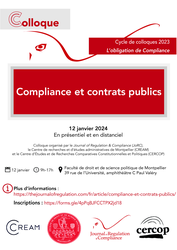
🌐follow Marie-Anne Frison-Roche on LinkedIn
🌐subscribe to the Newsletter MAFR Regulation, Compliance, Law
____
► Full Reference: M.-A. Frison-Roche, C. Gilles and A. Oumedjkane (dir.), Compliance et contrats publics (Compliance and public contracts), Journal of Regulation & Compliance (JoRC), Centre de recherches et d’études administratives de Montpellier (CREAM) and Centre d’Études et de Recherches Comparatives Constitutionnelles et Politiques (CERCOP) of the Montpellier University, Faculté de droit et de science politique de Montpellier, January 12, 2024
____
🌐consult a general presentation of this event on LinkedIn, linking to a presentation of each speech (in French)
____
🏗️This symposium takes place in the cycle of symposiums organised by the Journal of Regulation & Compliance (JoRC) and its partners Universities, focusing in 2023-2024 on the general theme of the Compliance Obligation
____
📚The works will then be inserted in the books:
📕Compliance et contrat, to be published in the 📚Régulations & Compliance Serie, co-published by the Journal of Regulation & Compliance (JoRC) and Dalloz, published in French.
📘Compliance & Contract, to be published on the 📚Compliance & Regulation Serie, co-published by the Journal of Regulation & Compliance (JoRC) and Dalloz, published in English.
____
► General presentation of the symposium: Compliance is developing throughout the legal system, through both Public and Private Law techniques. Public Contract Law bears witness to this in two ways: through its scope, in that Compliance applies to economic relationships entered into by public bodies, and through its object, which internalises a reconciliation between their economic interests and a set of other general interest objectives, or "Monumental Goals", a reconciliation for which public bodies have traditionally been responsible. In addition to unilateral acts, contracts have their rightful place as a practical means of achieving this reconciliation. Its flexibility allows for negotiation and adjustment of the burdens to be placed on the co-contracting parties.
The aim of this symposium is to link the different manifestations of the Compliance Obligation in public contracts and thus give coherence to policies which are still too often considered in a watertight manner because they relate to very different aims and areas.
Firstly, at the procurement stage, the promotion of responsible or innovative procurement, particularly from an environmental point of view, is one of the signs of Compliance's presence. On a completely different note, the same is true of the CJEU's challenge to the automatic application of bans on tendering, which prevent contracting authorities from ruling on a candidate's reliability by taking into account the compliance programmes implemented by companies since their conviction.
Secondly, at the litigation stage, the Conseil d'État's (French Council of State) recent broad recognition of the illegality of an administrative contract on the grounds of a breach of ethical obligations has tempered the drive to make contracts more secure, drawing the consequences of the major drive for transparency in public life that has been underway since 2013.
The aim of the morning session will be to understand the various forms of the Compliance Obligation in public contracts. This overview will make it possible, in the afternoon, to aim to unify the Compliance Obligation in public contracts.
____
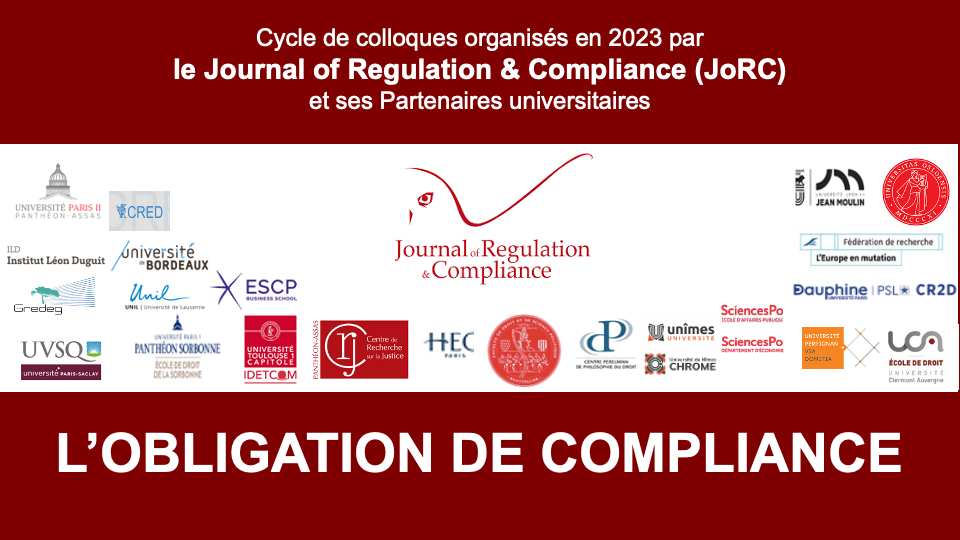
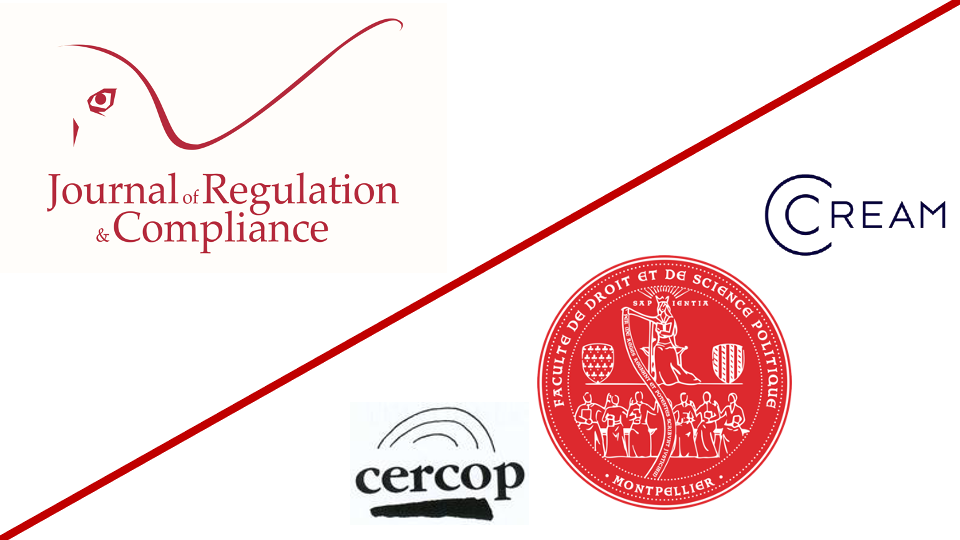
____
► Speakers:
🎤Ugo Assouad, PhD student at the Montpellier University, CREAM
🎤Philippe Augé, President of the Montpellier University
🎤Clémence Ballay-Petizon, PhD student at the Montpellier University, CREAM
🎤Yannisse Benrahou, PhD student at Paris-Nanterre University, CRDP
🎤Léon Boijout, PhD student at the Montpellier University, CREAM
🎤Julien Bonnet, Full Professor at the Montpellier University, CERCOP
🎤Guylain Clamour, Dean of the Montpellier Faculty of Law and Political Science
🎤Marie-Anne Frison-Roche, Professor of Regulatory and Compliance Law, Director of the Journal of Regulation & Compliance (JoRC)
🎤Pierre-Yves Gadhoun, Professor at the Montpellier University, CERCOP
🎤Pascale Idoux, Professor at the at the Montpellier University, CREAM
🎤Nedjma Kontoukas, PhD student at the Montpellier University, CREAM
🎤Valentin Lamy, Senior Lecturer at the Lorraine University, IRENEE
🎤Antoine Oumedjkane, Senior Lecturer at Lille University, ERDP
🎤Lucien Rapp, Emeritus Professor at Toulouse Capitole University
🎤Marion Ubaud-Bergeron, Full Professor at the Montpellier University, CREAM
____
🧮Read a detailed presentation of the event below⤵️
Jan. 4, 2024
Thesaurus : Doctrine
► Référence complète : V. Lasserre, "Les sources textuelles internes et européennes du droit des affaires. L'exemple du devoir de vigilance", JCP E, n° 1, 4 janvier 2024, étude n° 1002, pp. 23-27
____
► Résumé de l'article (fait par l'auteure) : "Comprendre la loi sur le devoir de vigilance est utile. Premièrement, parce que ce devoir est un modèle qui tend à être diffusé. Poursuivant dans le sillon du législateur français, le législateur européen est également en train de construire un cadre européen pour le devoir de vigilance des entreprises. Deuxièmement, parce que de nombreuses actions en justice ont été intentées, montrant la vita- lité de ce devoir. Troisièmement, parce que ce devoir est un moment clé dans le développement de la responsabilité sociale et environnementale des entreprises. On démontrera que des sources hétéroclites ont concouru à forger le devoir de vigilance et que les mots de la loi oscillent entre rupture et continuité.".
____
🦉Cet article est accessible en texte intégral pour les personnes inscrites aux enseignements de la Professeure Marie-Anne Frison-Roche
________
Dec. 27, 2023
Thesaurus : Doctrine
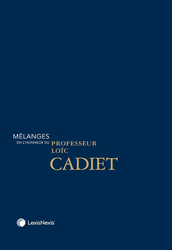
► Référence complète : M. Fabre-Magnan, "Critique de la convergence des responsabilités contractuelle et délictuelle. L'exemple du devoir de vigilance", in Mélanges en l'honneur du Professeur Loïc Cadiet, LexisNexis, 2023, pp. 547-561
____
► Résumé de l'article : Après avoir rappelé les oppositions doctrinales entre les auteurs qui considèrent que la responsabilité civile délictuelle n’existerait pas et ne serait qu’une exécution par équivalent du contrat, et ceux qui au contraire sont partisans d’une assimilation des responsabilités civiles contractuelle et délictuelle, l'auteure s'attache à démontrer que les évolutions contemporaines du droit de la responsabilité nous orientent vers une confusion des responsabilités délictuelle et contractuelle, au détriment de la première. Cette extension du modèle de la responsabilité contractuelle à la responsabilité délictuelle est porteuse de 3 risques : une relativisation de la responsabilité délictuelle, une limitation de la réparation aux dommages prévisibles et une réduction de cette responsabilité à l’exécution d’obligations déterminées.
Pour illustrer ce phénomène, l’auteure prend l’exemple fil rouge du devoir de vigilance des sociétés mères et entreprises donneuses d'ordre, dont le régime de responsabilité, ou du moins les analyses qui en sont faites, sont particulièrement révélateurs de ce mouvement.
À ce titre, l’auteure pointe le risque de confusion qui existe entre l’obligation générale de prudence et de diligence découlant des articles 1240 et 1241 du Code civil et les autres devoirs et obligations spéciaux, dont le devoir de vigilance fait partie. Elle met en avant l’importance de bien distinguer entre ce qui est spécial et ce qui est général, ce qui l’amène à réaffirmer une distinction entre des éléments souvent confondus : le devoir de vigilance, la diligence et le duty of care britannique.
Elle critique également la logique qui consisterait à limiter l’action en responsabilité civile sur le fondement du devoir de vigilance au « bénéficiaire » de cette loi. Un tel raisonnement, de recherche d’un bénéficiaire dont les intérêts seraient protégés par un texte et qui de fait aurait intérêt à agir en cas de violation de celui-ci, n’est pas d’essence délictuelle mais contractuelle et ne devrait pas s’appliquer ici. Elle estime que tout manquement à ce devoir spécial devrait permettre à toute personne qui y a intérêt d’agir sur le fondement de la responsabilité civile délictuelle.
L’auteure constate par ailleurs une tendance à limiter la réparation du dommage, dans le cadre de la responsabilité civile délictuelle, au dommage qui serait prévisible, comme en matière de responsabilité civile contractuelle. Elle relève également la montée en puissance contemporaine de la prévention des dommages et d’une responsabilité ex ante. Elle met en garde sur le fait que si ce mouvement est heureux, il ne doit pas conduire à limiter la responsabilité civile délictuelle classique. Par exemple, en matière de vigilance, elle estime que le respect par l’entreprise des obligations ex ante de détection et prévention des dommages qui lui incombent au titre de la loi de 2017 ne doivent pas constituer une cause d’exonération lui permettant d’échapper à une action en responsabilité civile délictuelle (fondée sur une faute autre que l’élaboration et la mise en oeuvre du plan) en cas de réalisation effective d’un dommage.
____
🦉Cet article est accessible en texte intégral pour les personnes inscrites aux enseignements de la Professeure Marie-Anne Frison-Roche
________
Dec. 12, 2023
Conferences

► Référence complète : M.-A. Frison-Roche, enregistrement et animation d'une série d'entretiens sur le Droit de la Compliance, in J.-Ph. Denis, Fenêtres ouvertes sur la gestion, Xerfi Canal, tenus le 12 décembre 2023, diffusés en 2024.
____
► Présentation générale de la série, comprenant les entretiens successifs : 🧱Compliance - un sujet de choix pour nouer Droit et Gestion : La distinction des disciplines est justifiée, le droit d'une part, la gestion d'autre part : c'est maltraiter la réalité que, notamment, de dissoudre l'une dans l'autre (ce que Jankélévitch appelait "la réduction par déplacement d'une discipline") car chacune doit conserver son ancrage.
Ceci posé, parce que la réalité ne se construit suivant les disciplines, si l'on veut rendre compte de celle-ci, ou au moins en tenir compte, par exemple de la réalité des entreprises, il faut que les disciplines se croisent.
La compliance est un parfait terrain pour cela.
Merci à Jean-Philippe Denis, professeur de gestion, qui est depuis toujours ouvert à ce dialogue, de l'avoir concrétisé plus encore, en permettant une série d'interviews à la croisée du Droit et de la Gestion sur le média Xerfi Canal.
____
Dans un premier temps, 4 discussions ont été tenues entre Jean-Philippe Denis et moi-même sur les thèmes suivants :
- 🎬sur la nécessité pratique de faire converger l'analyse juridique et l'analyse de gestionnaire lorsqu'il s'agit de comprendre, maîtriser, promouvoir la compliance (diffusé le 23 septembre 2024) : cliquer ICI
- 🎬sur l'existence de différents systèmes de compliance selon les zones du mondes
- 🎬sur la "civilisation" de la Compliance
- 🎬sur le fait que la Vigilance est la pointe avancée de la Compliance (diffusé le 13 juin 2024) : cliquer ICI
Puis, dans un second temps
- 🎬avec 🕴️Jean-Baptiste Racine sur la manière dont l'arbitrage international est apte aujourd'hui à défendre les Buts Monumentaux de la Compliance, notamment les droits humains et les impératifs environnementaux.
- 🎬avec 🕴️Stanislas Pottier de la façon dont les entreprises intègrent cet impératif de compliance, notamment dans sa dimension environnementale, participent à la construction européenne par cette voie, et arrivent à faire connaissance avec ce personnage assez nouveau pour elle, au moins en France : le juge (diffusé le 27 avril 2024) : cliquer ICI
- 🎬 avec 🕴️Roch-Olivier Maistre du rôle que joue l'Arcom dans le nouveau système numérique qui se met en place, et quelle articulation se noue entre la Régulation et la Compliance, notamment pour mesurer en quoi la Compliance est un outil utile pour assurer une meilleure supervision des plateformes en ligne et lutter ainsi plus efficacement contre les phénomènes de manipulation de l’information et de haine en ligne (diffusé le 16 mars 2024) : cliquer ICI
- 🎬avec 🕴️Eduardo Silva-Romero de l'importance grandissante de l'arbitrage international pour les entreprises, arbitrage qui intègre les intérêts des États et répond aux impératifs de Compliance (diffusé le 27 avril 2024) : cliquer ICI
- 🎬avec 🕴️Christophe Lapp de la nécessité pratique de ne pas confondre la Compliance avec la simple conformité, notamment lorsque le juge est saisi, les Buts Monumentaux étant intégrés dans son raisonnement (diffusé le 3 février 2024) : cliquer ICI
- 🎬avec 🕴️Jacques Beyssade du rapport entre la gouvernance et la Compliance, illustré dans une banque mutualiste et plus particulièrement dans le recrutement et la promotion des femmes à des postes de responsabilité (diffusé le 24 février 2024) : cliquer ICI
____
____
🔓consulter ci-dessous une présentation de chaque interview mené avec un expert en Droit sur un sujet particulier de Droit de la Compliance⤵️

Dec. 5, 2023
Organization of scientific events
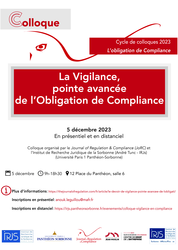
► Référence complète : M.-A. Frison-Roche, M. Mekki et J.-Ch. Roda (dir.), La Vigilance, pointe avancée de l'Obligation de Compliance, Journal of Regulation & Compliance (JoRC), Institut de Recherche Juridique de la Sorbonne (André Tunc - IRJS), Université Paris 1 Panthéon-Sorbonne, 5 décembre 2023.
____
🏗️Ce colloque s'inscrit dans le cycle de colloques organisé par le Journal of Regulation & Compliance (JoRC) et ses Universités partenaires, portant en 2023 sur le thème général de L'Obligation de Compliance.
____
📚Les travaux s'inséreront ensuite dans les ouvrages :
📕L'obligation de Compliance, à paraître dans la collection 📚Régulations & Compliance, coéditée par le Journal of Regulation & Compliance (JoRC) et Dalloz, publié en langue française.
📘Compliance Obligation, à paraître dans la collection 📚Compliance & Regulation, coéditée par le Journal of Regulation & Compliance (JoRC) et Bruylant, publié en langue anglaise.
____
► Présentation générale du colloque : L'Obligation de Vigilance est difficile à cerner à travers la multiplicité des textes et les cas dans lesquels on peut l'appréhender. Cela est particulièrement perceptible à travers le mécanisme de Vigilance qui tout à la fois illustre, voire force le trait, de l'Obligation de Vigilance. A travers les textes internationaux, la loi française et les textes européens adoptés ou en gestation, les contraintes de vigilance, mais aussi les structures et actions mises en place que les entreprises ont organisé ainsi que les actions que les parties prenantes ont engagé, la Vigilance a mis en lumière des aspects de l'Obligation de Compliance, voire a modifié celle-ci.
L'effet de révélation ainsi produit et le mouvement ainsi déclenché, dont les racines sont profondes et les effets systémiques très importants, justifient que l'on cerne davantage des mécanismes qui sont articulés entre eux alors qu'ils sont parfois perçus en silo, ce qui rend difficile la compréhension d'ensemble. De la même façon, parce que la Vigilance est la pointe avancée de l'Obligation de Compliance, l'on peut ainsi mieux distinguer et articuler ce qui relève des spécificités sectorielles, notamment en matière bancaire et financière ou bien en matière numérique, et les articuler avec ce que la Vigilance a, comme la Compliance, de plus général. Plus encore, l'intensité de la Vigilance varie selon les ambitions quelle porte et selon la position de l'entreprise assujettie, ce que traduisent les variations de qualification juridique qui vont du devoir à l'obligation pénalement sanctionnée.
Les différents systèmes juridiques traduisent ces évolutions dans leur loi, leur jurisprudence et la pratique des entreprises et des parties prenantes de façon spécifique car ces différents techniques expriment des normes de comportement et de reddition de comptes dont les exigences probatoires, les conceptions de la responsabilité et les traductions institutionnelles à travers de possibles organes de régulation sont la traduction directe.
En conséquence, le colloque est construit en trois temps. Après une Introduction générale sur les rapports systémiques entre la Vigilance et la Compliance, une première partie porte sur la variation des Intensités de la Vigilance, pointe avancée de la Compliance, une deuxième partie porte sur les Tensions que la Vigilance engendre ou exacerbe, une troisième partie porte sur les Modalités que la Vigilance emprunte dans les systèmes de Compliance.
____

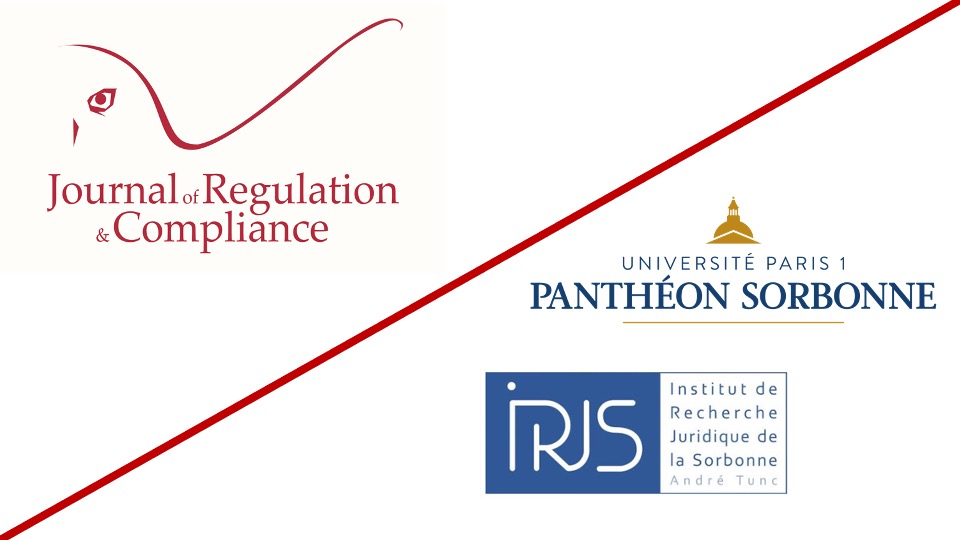
____
► Interviennent :
🎤Laurence Dubin, Professeure à l'Université Paris 1 Panthéon-Sorbonne
🎤Marie-Anne Frison-Roche, Professeure de Droit de la Régulation et de la Compliance, directrice du Journal of Regulation & Compliance (JoRC)
🎤Bernard Haftel, Professeur à l'Université Paris-Nord
🎤Marie Lamoureux, Professeure à Aix-Marseille Université
🎤Grégoire Loiseau, Professeur à l'Université Paris 1 Panthéon-Sorbonne
🎤Véronique Magnier, Professeure à l'Université Paris-Saclay
🎤Gilles J. Martin, Professeur émérite à l'Université Côte d'Azur, membre du Groupe de Recherche en Droit, Économie, Gestion (GREDEG) du CNRS
🎤Mustapha Mekki, Professeur à l'Université Paris 1 Panthéon-Sorbonne
🎤Jean-Christophe Roda, Professeur à l'Université Jean Moulin Lyon 3
🎤Anne-Claire Rouaud, Professeure à l'Université Paris 1 Panthéon-Sorbonne
____
Lire une présentation détaillée de la manifestation ci-dessous⤵️
Dec. 5, 2023
Conferences
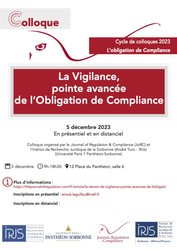
🌐suivre Marie-Anne Frison-Roche sur LinkedIn
🌐s'abonner à la Newsletter MAFR Regulation, Compliance, Law
____
► Référence complète : M.-A. Frison-Roche, "Articulation systémique entre Vigilance, Due Diligence, conformité et Compliance", in M. Mekki, M.-A. Frison-Roche et J.-Ch. Roda (dir.), La vigilance, pointe avancée de l'obligation de Compliance, Journal of Regulation & Compliance (JoRC) et Institut de Recherche Juridique de la Sorbonne (André Tunc - IRJS), Université Paris 1 Panthéon-Sorbonne, 12 place du Panthéon, salle 6, 5 décembre 2023.
____
🧮consulter le programme complet de cette manifestation
____
🚧lire le document de travail bilingue sur la base duquel la conférence a été élaborée
____
consulter les slides accompagnant la conférence
____
► Résumé de la conférence :
____
Cette conférence sera suivie d'un article qui sera publié dans l'ouvrage L'obligation de Compliance.
________
Dec. 5, 2023
Thesaurus : 08. Juridictions du fond
► Full Reference: Tribunal judiciaire de Paris (Paris First Instance Civil Court), pôle social (social division), 1ière chambre (first chamber), 4ième section (4th section), December 5, 2023, No. RG 21/15827, La Poste.
____
🏛️read the decision (in French)
____
📰read the press release accompanying the decision (in French)
________

Dec. 1, 2023
Publications

🌐suivre Marie-Anne Frison-Roche sur LinkedIn
🌐s'abonner à la Newsletter MAFR Regulation, Compliance, Law
____
 ► Référence complète : M.-A. Frison-Roche, Articulation systémique entre Vigilance, Due Diligence, conformité et Compliance, document de travail, novembre 2023.
► Référence complète : M.-A. Frison-Roche, Articulation systémique entre Vigilance, Due Diligence, conformité et Compliance, document de travail, novembre 2023.
____
🎤 Ce document de travail a été élaboré pour servir de base à la conférence introductive au colloque La Vigilance, pointe avancée de l'Obligation de Compliance organisé par le Journal of Regulation & Compliance et l'Université Panthéon-Sorbonne (Paris I) se déroulant le 5 décembre 2023
____
📝Il est aussi la base à l'article constituant l'une des contributions de l'ouvrage L'Obligation de Compliance.
____
► Résumé du document de travail : Le thème général sur lequel de nombreux experts se réunissent pour échanger leurs connaissances et leurs conceptions est celui de La Vigilance, pointe avancée du système de Compliance. Dans la présente étude, il s'agit non pas de traiter le thème à leur place, ni de conclure déjà par anticipation ce qu'il faudrait en penser, mais bien d'introduire un thème, qui tient tout à la fois du très particulier lorsqu'on pense à la loi française du 27 mars 2017 dite Vigilance et du très général lorsqu'on pense à ses finalités qui sont, rien que cela, le sauvetage de la planète et des êtres humains qui y vivent et qui y vivront, finalités qui sont celles du système de Compliance et du Droit de la Compliance qui prend téléologiquement sa normativité dans ses Buts Monumentaux.
Pour introduire les réflexions qui vont venir, il est utile de s'appuyer sur l'hypothèse qui sous-tend l'intitulé même de la manifestation selon laquelle la Vigilance serait la "pointe avancée" de l'Obligation de Compliance". C'est cette hypothèse même qui doit être étayée, contredite, illustrée, "éprouvée", c'est-à-dire "prouvée". Si elle est solide et qu'elle est nuancée par d'autres conceptions qu'elle est apte à accueillir, et qu'on en trouve déjà des illustrations dans les lois, les réglementations, le droit que l'on dit "souple" et les décisions des juges, des autorités de régulation et de supervision
____
🔓lire le document de travail ci-dessous⤵️

Nov. 30, 2023
Organization of scientific events
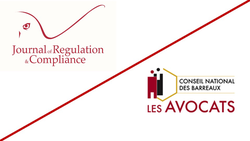
► Référence complète : M. Boissavy, H. Dehghani-Azar et M.-A. Frison-Roche (dir.), Journal of Regulation & Compliance (JoRC) et Conseil national des barreaux (CNB), Compliance, Vigilance et Médiation, Auditorium de la Maison du Barreau, 30 novembre 2023
____
► Présentation générale du colloque : Pour accroître le respect des droits humains et de l’environnement dans le cadre de la responsabilité sociale des entreprises et de la compliance, les pouvoirs publics et les entreprises mettent en œuvre depuis plusieurs années des instruments et processus de dialogue entre l’entreprise d’une part et les parties prenantes internes et externes à l’entreprise d’autre part. Parmi eux la médiation est régulièrement mise en avant comme étant un processus nécessaire et fécond pour trouver des accords bénéfiques tant pour les salariés et les acteurs de la société civile que pour l’environnement et la société globale.
John Ruggie, Représentant spécial du Secrétaire général chargé de la question des droits de l’Homme et des sociétés transnationales et autres entreprises, dans son rapport du 21 mars 2011, Principes directeurs relatifs aux entreprises et aux droits de l'homme, recommande la médiation comme mécanisme de réclamation non judiciaire efficace et approprié. La norme ISO 26000 sur la responsabilité sociétale vise aussi explicitement le recours à la médiation au point « Actions et attentes associées » (6.3.2.6) en ces termes : « il convient qu’une organisation établisse des mécanismes de recours pour son propre usage et pour celui des parties prenantes, ou qu’elle en assure la disponibilité. Pour que ces mécanismes soient efficaces, il convient qu’ils soient […] fondés sur le dialogue et la médiation : il convient que le processus vise à remédier aux atteintes à l’aide de solutions mutuellement acceptées, obtenues par un dialogue entre les parties. Lorsqu’un jugement est souhaitable, il convient que les parties conservent le droit d’y parvenir au moyen de mécanismes distincts, indépendants ».
De la même façon, la loi n°2017-399 du 21 mars 2017 relative au devoir de vigilance des sociétés mères et des entreprises donneuses d’ordre suscite des contentieux relatifs à la conception et à l’application de plans de vigilances de certaines entreprises assujetties. Le recours à la médiation a été proposé par le juge, parfois accepté et l’on sait que certaines ont réussi.
Parallèlement, le projet de directive européenne sur le devoir de vigilance des entreprises en matière de durabilité (dite CS3D pour Corporate Sustainability Due Diligence Directive) est de nature, à faire peser ou à étendre pour un grand nombre d’entreprises de l’Union Européenne des obligations au titre du devoir de vigilance pour le respect des droits de l’homme et l’environnement par les entreprises dans les chaînes de valeur mondiales.
Il résulte de tout cela que lee respect des droits de l’Homme au sein des organisations et entreprises repose le recours aux juridictions, sur des processus de coopération comme peut l’être la médiation, tant celle de projet que celle spécifique à la résolution des différends, dans le même temps que le recours juridictionnel ne suffira pas à rendre rapidement efficace le respect de ces obligations.
Le législateur et les parties concernées en sont conscientes et elles évoquent le recours à la médiation comme nécessaire pour aider tant les acteurs de la société civile engagés pour le respect des droits humains et de l’environnement que les entreprises à trouver des accords pour le respect de ces obligations.
Les avocats, médiateurs, personnes assistant les parties prenantes et les entreprises, ont un rôle important à jouer pour le succès de ces médiations.
Le Conseil national des barreaux organise, en collaboration avec le Journal of Regulation and Compliance (JoRC), un colloque d’une demi-journée « Compliance, vigilance et médiation » pour former les avocats à cette activité qui va se développer soit en prolongement d’une activité soit en activité propre et qui a des implications importantes tant pour les droits de chacun, la société que pour l’environnement.
____
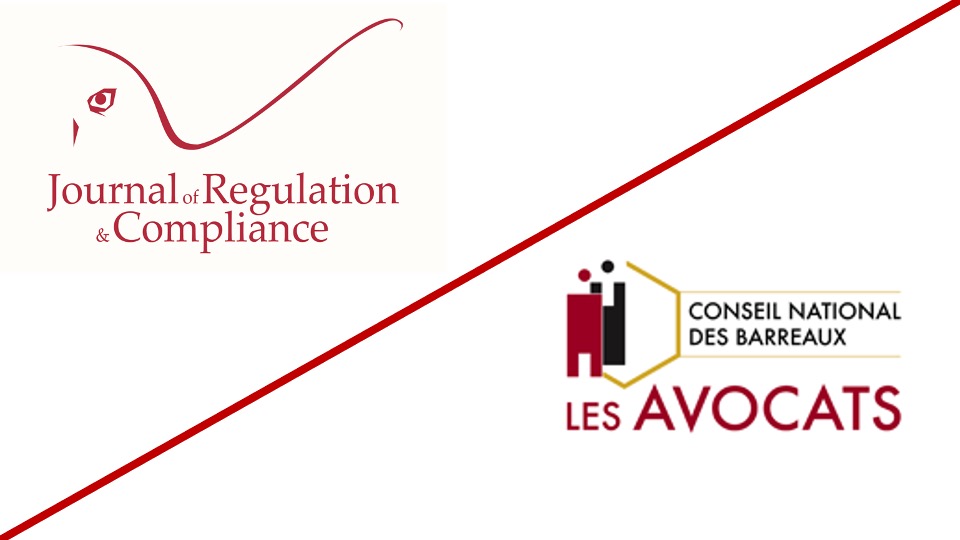
____
► Interviennent :
🎤Matthieu Boissavy, avocat au Barreau de Paris, vice-président de la Commission Liberté et droits de l'homme du CNB
🎤Matthieu Brochier, avocat au Barreau de Paris
🎤Stéphanie Brunengo, avocate au Barreau d'Aix-en-Provence, médiatrice
🎤Malik Chapuis, juge à la 3ième chambre civile du Tribunal judiciaire de Paris
🎤Lucie Chatelain, responsable contentieux et plaidoyer SHERPA
🎤Bruno Deffains, professeur à l'Université Paris Panthéon-Assas
🎤Hirbod Dehghani-Azar, avocat au Barreau de Paris, président de la Commission Modes alternatifs de règlements des Règlements (MARD) du CNB
🎤Marie-Anne Frison-Roche, professeure de Droit de la Régulation et de la Compliance, directrice du Journal of Regulation & Compliance (JoRC)
🎤Jérôme Gavaudan, président du CNB
🎤Thibault Goujon-Bethan, professeur à l'Université Jean Moulin Lyon 3
🎤Céline Haye Kioussis, directrice juridique du Groupe BPCE
🎤Laurence Joly, avocate au Barreau de Thonon-les-Bains
🎤Stéphane de Navacelle, avocat au Barreau de Paris
🎤Lori Roussey, Data Protection Officer, fondatrice et Directrice de Data Rights
🎤Stephanie Smatt Pinelli, directrice juridique Contentieux, groupe Orano
____
Lire une présentation détaillée de la manifestation ci-dessous⤵️
Nov. 30, 2023
Conferences
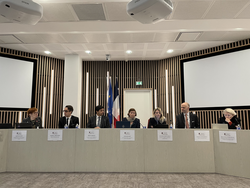
🌐follow Marie-Anne Frison-Roche on LinkedIn
🌐subscribe to the Newsletter MAFR Regulation, Compliance, Law
____
► Full Reference: M.-A. Frison-Roche, "Conclusion", in M. Boissavy, H. Dehghani-Azar, and M.-A. Frison-Roche (dir.), Journal of Regulation & Compliance (JoRC) and Conseil national des Barreaux (CNB), Compliance, vigilance et médiation (Compliance, Vigilance and Mediation), Amphitheatre of the Conseil national des Barreaux, November 30, 2023.
____
🧮see the full programme of this event
________
Nov. 6, 2023
Newsletter MAFR - Law, Compliance, Regulation

🌐suivre Marie-Anne Frison-Roche sur LinkedIn
🌐s'abonner à la Newsletter MAFR Regulation, Compliance, Law
____
► Référence complète : M.-A. Frison-Roche, "Compliance, Vigilance et Médiation (🧮30 novembre 2023)", Newsletter MAFR Law, Compliance, Regulation, 6 novembre 2023
____
📧Lire par abonnement gratuit d'autres news de la Newsletter MAFR - Law, Compliance, Regulation
____
🧱La médiation, un outil efficace et déjà éprouvé en matière de Vigilance
Le devoir de vigilance est la pointe avancée du droit de la compliance. La médiation commence déjà à montrer son efficacité pour la mise en oeuvre délicate voir controversée de la technique nouvelle de Vigilance.
____
📧voilà le programme détaillé du colloque que le Journal of Regulation & Compliance (JoRC) et le Conseil national des barreaux (CNB) organisent le 30 novembre 2023 sur le sujet, incluant les modalités d'inscription ⤵️
Oct. 19, 2023
Thesaurus : Doctrine
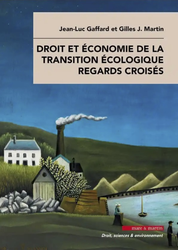
► Référence complète : J.-L. Gaffard & G. J. Martin (dir.), Droit et économie de la transition écologique. Regards croisés, Mare & Martin, coll. "Mare & Martin", 2023, 168 p.
____
____
____
► Résumé de l'ouvrage (fait par les auteurs) : "La transition écologique ne se décrète pas, elle se construit pas à pas. Le caractère irréductible de la contradiction entre activité humaine et préservation des éléments naturels ne saurait conduire à nier la complexité des rapports économiques et sociaux nécessaires pour y survivre. Au lieu d'énoncer un discours de vérité absolue que détiendrait un État omniscient ou le libre marché, le propos du présent ouvrage est d'ouvrir un débat démocratique dont l'objet est d'organiser le dissensus et de cultiver le compromis nécessaire pour rendre la transition viable. Pour répondre à ce défi, un regard croisé du Droit et de l'économie s'impose qui permet de souligner aussi bien la pluralité des ordres juridiques et des espaces normatifs que celle des ordres économiques au coeur desquels se trouve l'entreprise.".
________
Oct. 2, 2023
Conferences

♾️follow Marie-Anne Frison-Roche on LinkedIn
♾️subscribe to the Newsletter MAFR Regulation, Compliance, Law
____
► Full Reference: M.-A. Frison-Roche, Participation à la Table ronde "Normes de Responsabilité Sociale des Entreprises (RSE & Devoir de Vigilance)" (Participation in the Round Table "Corporate Social Responsibility Standards (CSR & Duty of Vigilance)"), in Fribourg University, Journée du Droit, Fribourg University, Pérolles site, room C230, October 2, 2023.
____
🧮see the full programme of this event
🎥watch the video of this event (in French)
____
🌐read the report written in French with photos, tags and links on LinkedIn and also with links to each the speech
____
► General presentation of the event : This conference, build around 4 presentations and a debate between the speakers and then with the audience, aimed at explaining and understanding this fundamental movement and the new texts that express it in Switzerland, even if it is French law, such as the so-called 'Vigilance' law of 2017 and the draft European CS3D directive, because on the one hand it is a movement that begins with legal technique and on the other hand the texts in question are extraterritorial in scope, if only because of the notion of 'value chain'. In the first part of this round table, and to set the scene, I will outline the origin and content of the French 'Vigilance' law, the way in which the draft directive draws heavily on it, its relationship with Compliance Law, of which it constitutes the 'advanced point', and the decisive role it gives to the courts, in the general movement of the jurisdictionalisation of compliance. The purpose of this is to allow the discussion to get underway.
🕴️Idris Abdelkhalek, PhD candidate and lawyer, introduced the speakers and led the debate between them and the audience. He took questions from the audience on the intensity of the obligation weighing on companies, in particular between civil liability and criminal liability, between the obligation of means and the obligation of result, and on the way in which the duty of vigilance is applied to specific sectors such as defence.
____
► Presentation of my speech : the subject of which was Presentation of French Vigilance law, European perspective and European Compliance System. My presentation was divided into four points. Firstly, I outlined the state of Law in France, in the novelty represented by the 2017 law known as the "Vigilance" law, whose principles are simple and strong, principles that are situated in the aims pursued, and the way in which this law inspires what is currently being negotiated: the CS3D Directive.
Secondly, I stressed the need for companies to master these often technically complicated corpus, especially if we take into account the link between Vigilance and the CSRD directive on sustainability reporting and extra-financial information.
Thirdly, I have shown that an overall understanding can nevertheless be achieved, and that the technical nature of the 'tools' is better mastered if we place the duty of vigilance within Compliance Law, of which it constitutes the 'advanced point'. All of this anchors its legal normativity in the 'Monumental Goals' it serves, which in Europe are humanistic, since the aim is to protect, now but above all in the future because it is a branch of ex ante Law, the human beings involved in the systems (banking, finance, energy, digital, climate, etc.).
Fourthly, I emphasised that this understanding enables everyone to play their part: political and public authorities, businesses and stakeholders. Even more, and at the heart of the matter, the judge plays an essential role, even in countries with so-called 'continental' Law. I have used current cases as examples. This is just the beginning, and judges need to train, specialise and work in dialogue to achieve this.
____
► Presentation of the other speakers contributions :
🕴️Marion Paradas, Ambassador of France to Switzerland and Liechtenstein, opened the conference and gave a general presentation of the theme. Ambassador Marion Paradas presented the international challenge represented by Law, illustrated here by the duty of vigilance. She emphasised that this is a major issue, both now and in the future, for Swiss companies and French companies based in Switzerland, particularly as this duty extends throughout the "value chain" and in view of the CS3D directive, which will also have consequences for both.
🕴️Isabelle Chabloz Waidacher, Professor at the Faculty of Law in Fribourg and holder of the Chair of Economic Law at the University of Fribourg, gave a Presentation of Swiss Law. In particular, she emphasised the state of Swiss Law, which could have gone further than the 2017 French law known as the "Vigilance" law if the popular initiative reference had led to the adoption of a law, and which currently focuses more on information and transparency obligations, with CSR taking over from there. But she stresses that the reality of value chains will force Swiss companies to take into account the requirements of the European directive currently being adopted.
🕴️Renaud Roussel, Managing Director of Colas Switzerland, presented an entrepreneurial view of the subject. He began by outlining the concrete steps taken by his industrial group in Switzerland and around the world to implement its commitments to protect the environment, for example by ensuring the proper use of materials used in road construction. He also stressed the importance of human rights, particularly in labour relations, in the context of CSR and vigilance. He went on to point out that it was not always easy for a large company to meet its own requirements, or the requirements imposed on it by the law, because in the construction and public works sector in particular it is often small companies that are competing, competitors who do not bear the costs of such obligations.
________
Oct. 1, 2023
Thesaurus : Doctrine
► Référence complète : J.-C. Roda, "Les obligations environnementales et numériques pesant sur les entreprises : quelle gestion des risques concurrentiels ?", Revue Lamy de la concurrence, n°131, 1er octobre 2023, actualité 4501.
____
► Résumé de l'article (fait par l'auteur) : "Les entreprises cruciales sont aujourd'hui soumises à des obligations de plus en plus lourdes et qui concernent l'environnement et le numérique. Le franchissement de seuils de « taille » oblige désormais ces acteurs à se plier à la logique de la vigilance et de la compliance. De telles obligations ont un impact concurrentiel, surtout si l'on envisage les choses sous l'angle de la concurrence mondialisée. Comment, dès lors, les entreprises concernées peuvent-elles réagir, pour transformer la contrainte en un nouveau départ ? Celui-ci est-il envisageable ? Faut-il faire acte de résilience ou de résistance ?"
____
🦉Cet article est accessible en texte intégral pour les personnes inscrites aux enseignements de la Professeure Marie-Anne Frison-Roche
________
Sept. 28, 2023
Thesaurus : Doctrine
► Référence complète : V. Magnier, "Devoir de vigilance et risques climatiques", in F. Barrière et M. Zolomian (dir.), Le droit des sociétés saisi par le climat, JCP E, n° 39, 28 septembre 2023, pp.18-21.
____
► Résumé de l'article (fait par l'auteure) : "L’introduction des outils de la compliance en droit des sociétés crée une approche juridique binaire : l’une préventive, l’autre de contrôle et de responsabilité. Alors que la loi sur le devoir de vigilance adopte cette double approche, l’analyse révèle qu’en dépit de l’encadrement d’un dispositif préventif ambitieux, la loi sur le devoir de vigilance peine sur le second volet, les contrôle et responsabilité restant lacunaires.".
____
🦉Cet article est accessible en texte intégral pour les personnes inscrites aux enseignements de la Professeure Marie-Anne Frison-Roche
_________
Sept. 28, 2023
Conferences
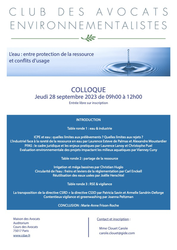
♾️follow Marie-Anne Frison-Roche on LinkedIn
♾️subscribe to the Newsletter MAFR Regulation, Compliance, Law
____
► Full Reference: M.-A. Frison-Roche, "Conclusion", in Club des avocats environnementalistes, L’eau : entre protection de la ressource et conflits d’usage, Maison des Avocats, Auditorium, September 28, 2023.
____
🧮see the full programme of this event
________
Sept. 27, 2023
Thesaurus : 02. Cour de cassation
Aug. 3, 2023
Publications
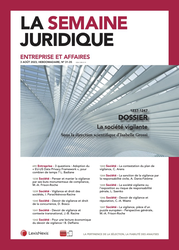
♾️follow Marie-Anne Frison-Roche on LinkedIn
♾️subscribe to the Newsletter MAFR Regulation, Compliance, Law
____
► Full Reference: M.-A. Frison-Roche, "Penser et manier la vigilance par ses buts monumentaux de compliance" ("Thinking and using Vigilance through its Compliance Monumental Goals"), in I.Grossi (ed.), La société vigilante, JCP E, No. 31-35, 3 August 2023, pp.16-20.
____
📙this article is the introduction of this special issue.
It is linked to the concluding article of this special issue: 📝La vigilance, pièce d'un puzzle européen (Vigilance, a piece of the European puzzle)
____
🧮the 2 articles follow on from the introductory and concluding speeches in the colloquium La Société vigilante, held at the University of Aix Marseille on 24 March 2023
____
🚧read the bilingual Working Paper which is the basis of this article, with additional developments, technical references and hyperlinks
____
► Summary of the article: The concept of "Vigilance" is difficult to define. Probably because even as it is becoming a standard, it has just entered the legal systems. And what a splash it is! To understand it, it must not be isolated. Neither in the only French law attracting all the attention, all the fears, all the hopes, the so-called Loi Vigilance ("Vigilance Law"), nor in the only technical mechanisms that make Vigilance a reality.
Vigilance is itself only a part of a deeper movement, of which it is the advanced point, allowing us to anticipate the evolution of the whole: Compliance Law.
In this light and for not getting lost in it, because the stakes are so high that one quickly loses the measure of things, with each party lashing out at the others, so Vigilance, the key element of Compliance, requires above all alliances, that we can first examine the entry of Vigilance into the legal system and then understand it through the Monumental Goals which give the measure of it, i.e. both the scope and the limit, each one having to act within the margins that are theirs, States, companies, stakeholders, and judges.
A Will for tomorrow can then emerge today, carried by Europe.
____
📝read the article (in French)
________
Aug. 3, 2023
Publications

♾️follow Marie-Anne Frison-Roche on LinkedIn
♾️subscribe to the Newsletter MAFR Regulation, Compliance, Law
____
► Full Reference: M.-A. Frison-Roche, "La vigilance, pièce d'un puzzle européen" ("Vigilance, a piece of the European puzzle"), in I.Grossi (ed.), La société vigilante, JCP E, No. 31-35, 3 août 2023, pp.57-58.
____
📙this article is the conclusion of this special issue.
It is linked to the introductory article of this special issue: 📝Penser et manier la vigilance par ses buts monumentaux de compliance (Thinking and using Vigilance through its Compliance Monumental Goals)
____
🧮the 2 articles follow on from the introductory and concluding speeches in the colloquium La Société vigilante, held at the University of Aix Marseille on 24 March 2023
____
🚧read the bilingual Working Paper which is the basis of this article, with additional developments, technical references and hyperlinks
____
► Summary of the article: The contributions form a contrasted whole. It should not be concluded that some of them are correct and others false: through the reading that each one makes of the so-called French 2017 "Vigilance law," it is a vision of the world as it should be that each author proposes. Because Compliance Law, which Vigilance is a part, claims to draw the future, it is normal that each author should draw the present Law with a hand that bends in one direction or the other, following their conception of the future world. The whole contributions must be seen as a dialogue.
A lively dialogue, with this French 2017 law receiving a lot of "glory" and a lot of "indignity" on both sides, from which it is necessary to emerge in order to find solutions, because it is a fundamental movement of which this law is only a gateway (I). Whatever one thinks of it, it is all the branches of law that are used, affected, and transformed by Vigilance (II). To master this profound transformation, we must turn to Europe, to the great puzzle of texts recently adopted or in the process of being adopted in the European Union, of which Vigilance is the hallmark (III).
____
📝read the article (in French)
________
July 15, 2023
Newsletter MAFR - Law, Compliance, Regulation

🌐suivre Marie-Anne Frison-Roche sur LinkedIn
🌐s'abonner à la Newsletter MAFR Regulation, Compliance, Law
____
► Référence complète : M.-A. Frison-Roche, "Compliance & Contrat / lien entre Consentement et Volonté ; enjeu de responsabilité personnelle : CNIL, 15 juin 2023, Criteo", Newsletter MAFR Law, Compliance, Regulation, 15 juillet 2023.
____
📧Lire par abonnement gratuit d'autres news de la Newsletter MAFR - Law, Compliance, Regulation
____
🧱L'obligation légale de Compliance doit être exécutée grâce à des contrats, mais l'on ne peut s'en décharger par des contrats : CNIL, 15 juin 2023, Criteo
____
📧lire l'article ⤵️
July 13, 2023
Thesaurus : Doctrine
► Référence complète : N. Ida, "Contrat et devoir de vigilance des sociétés", JCP E, n° 28, 13 juillet 2023, pp.17-26.
____
► Résumé de l'article (fait par l'auteur) : "Le contrat constitue l’instrument indispensable de déploiement de la vigilance sociale et environnementale dans les « chaînes de valeur » des sociétés donneuses d’ordre. Pourtant, la loi n° 2017-399 du 27 mars 2017 sur le devoir de vigilance des sociétés mères et entreprises donneuses d’ordre n'évoque pas le contrat, dont les liens avec le devoir de vigilance ont en conséquence été peu étudiés. Ce silence étonne car les sociétés concernées ne peuvent exercer leur devoir légal qu’en devenant créancières d’obligations de vigilance au moyen de clauses insérées dans leurs contrats commerciaux. Cette vigilance contractuelle imposée par la loi et bientôt par la directive européenne en cours d’adoption ne pourra atteindre son but qu’à la condition d’adapter les clauses de vigilance aux spécificités des relations contractuelles entretenues avec les fournisseurs et sous-traitants des sociétés donneuses d’ordre.".
____
🦉Cet article est accessible en texte intégral pour les personnes inscrites aux enseignements de la Professeure Marie-Anne Frison-Roche
________